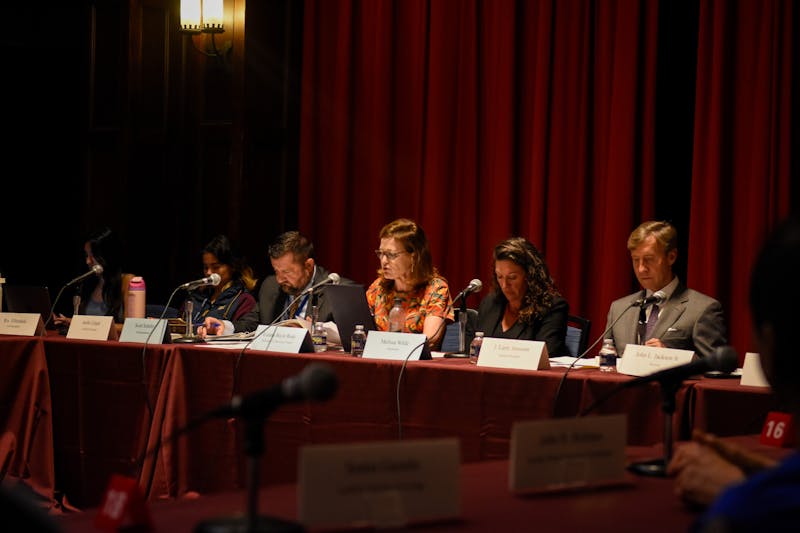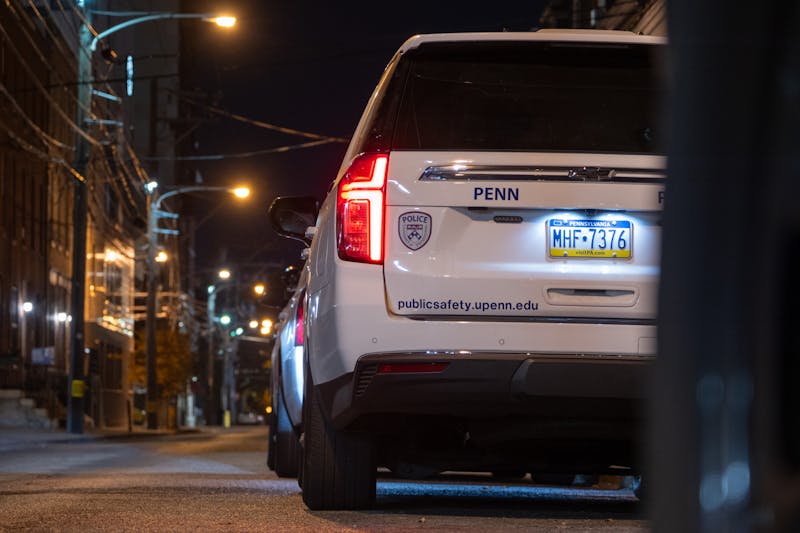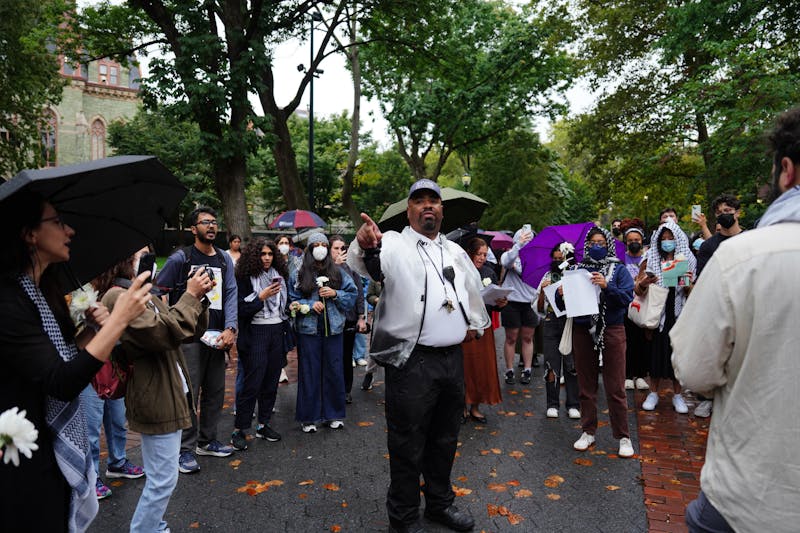
Penn students expressed concerns about free speech on campus, Penn's raid of an off-campus residence home to pro-Palestinian activists, and the University's investments at the Dec. 4 University Council open forum.
The open forum — which allows all Penn community members to bring forward topics to University Council — was held in the Hall of Flags at Houston Hall. Other topics of discussion included increased police presence on campus and the University's response to graduate student union demands.
Several community members spoke about the actions of Penn Police and the University's approach to campus safety. Students raised particular concerns about Penn Police's execution of a search warrant at an off-campus residence belonging to pro-Palestinian student activists in October.
“According to new sources, the Penn police were in SWAT gear and trained assault rifles on the students," Graduate School of Education professor Gerald Campano said. "Let that sink on, trained assault rifles on the students. A student could have been killed.”
The Daily Pennsylvanian was unable to independently confirm these details about the search, which were alleged in an Instagram post by Penn Students Against the Occupation of Palestine.
English professor Chi-ming Yang requested that the University “remove semi-automatic weapons from Penn police and staff.”
“Campus safety is a real concern, but not for the reasons that have driven University admin to erect metal signs and barricades prohibiting disobedient speech,” Yang added.
College senior Sara Heim expressed concerns about barricades around College Green and mentioned the required identification checks on Locust Walk earlier this year to access the area around College Green, which she described as creating “a sense of militarization that is being prioritized over use of outdoor campus space and even building accessibility.”
During the new business part of the meeting following the open forum, College junior Leo Solga — the speaker of Penn's Undergraduate Assembly — also questioned the purpose of the barricades.
“The metal barricades around and near College Hall seem to be assembled. Why are they there? Could they be removed? They feel cowardly,” Solga said.
Weitzman School of Design graduate student Alvin Luong drew a parallel between protests against University involvement in Vietnam and current protests over Penn’s role in Gaza, and read an address given during the Vietnam War denouncing Penn’s involvement with weapons research.
Cinema and Media Studies professor Karen Redrobe also criticized University administrators for attempting to move a vigil held in September to mourn "martyrs, from Palestine to Lebanon to Syria." Redrobe drew connections to Sophocles’ “Antigone,” comparing Penn’s shutting-down of the vigil to King Creon’s refusal in the play to allow burial and mourning rites for Antigone’s brother.
“Penn’s leadership strategy echoes the tragic rigidity and simplicity of Creon in the face of human complexity, strife, and loss,” she said. “Antigone’s refusal is motivated partly by the knowledge that it is her own soul on the line, and that our accountability to the dead endures while authoritarian power structures do not.”
Multiple students and professors voiced concerns about Penn's ties to Ghost Robotics, a company housed in Pennovation Works that develops four-legged robots used for “data collection, intelligence, security, asset protection, and military-specific uses.” Several protests on Penn's campus over the past year have called on the University to cut ties with Ghost Robotics, alleging that the company produces robots used by the Israeli military.
“I demand that the University terminates their agreement to lease to Ghost Robotics. You have chosen to remain complicit in genocide with your investments and academic partnerships,” physics doctoral candidate William Chan said.
Yang echoed similar concerns, calling for Penn to have "serious, open discussions and debate around cutting ties with Ghost Robotics, and more generally, around the Department of Defense funding of our robotics and science research.”
Several attendees disrupted the forum at various points. During the meeting’s opening presentation on Penn’s history in West Philadelphia, Associate Vice President in the Office of the Executive Vice President Anthony Sorrentino stated that Penn was “deeply engaged” in local communities of color. An attendee interrupted, saying, “Lies!”
Sociology professor and moderator Melissa Wilde responded that the meeting was intended to be "civil."
"If you're not going to allow us to continue our meeting, you will be escorted out," she said.
Three speakers from GET-UP, Penn's graduate student union, also spoke at the meeting.
Annenberg School for Communication doctoral candidate Kallahan Brown presented on the union’s proposal for an article protecting graduate student workers from abuse, harassment, and discrimination. Brown unrolled a petition to establish such an article with over 1,000 graduate student signatures.
College doctoral student Sam Samore spoke about the union’s proposal for free speech rights, and Engineering doctoral student Xiangyi Fang discussed international graduate students’ anxiety about their immigration statuses given Trump’s reelection, noting that International Student and Scholar Services “does not always have the bandwidth” to support students.
The speakers criticized Penn for delays in negotiations, demanding that administrators provide more timely responses to their demands.
“Penn’s team has not responded to 12 of the 20 articles we've submitted, despite having ample time to do so,” Samore said.
They added that when Penn’s administration does respond, “they are unable to answer many of our questions without consulting members of the University administration who are not present at the table.”
The open forum also included speeches calling for the establishment of a military resource center on Penn’s campus and advocating for menstrual product availability on campus.
The Daily Pennsylvanian is an independent, student-run newspaper. Please consider making a donation to support the coverage that shapes the University. Your generosity ensures a future of strong journalism at Penn.
Donate











